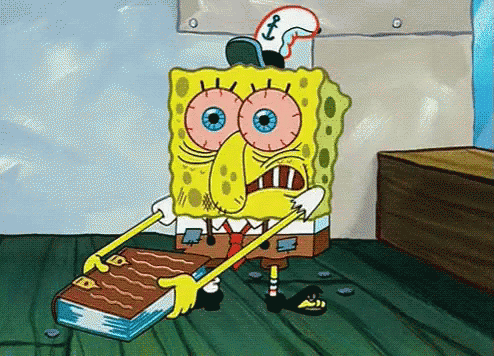Asking for a friend, of course...
But really. I'm not currently interviewing, but I've failed plenty of technical interviews before and I still shudder thinking of my very first one.
I bombed it.
After, I didn't know what to do. I wondered if I should just give up.
Doing poorly in a technical interview meant I wasn't cut out to be a developer. At least, that's what I believed at the time.
Fast forward to today and I know that isn't true. But I often hear aspiring developers talk about how failing technical interviews shook their confidence afterwards and made them question if they could really become devs.
So here's a question that I'd love to hear the answer to from other developers--how do you bounce back after a technical interview? What do you tell yourself? What do you do next?
One thing that's been helpul for me:
Always figure out the answer later. At the end of the interview, it seems like I'll never understand what the solution to the technical problem presented to me was. But later, when I learn as I go over it, I see that I can. That helps rebuild my confidence as I identify the knowledge gap that preventing me from understanding the problem, and I close that gap.
But I wish I would have known this sooner. That's why I created this thread.
In your experience, what should you do after you fail the technical interview to ensure that you'll learn and grow as a developer because of the experience, not in spite of it?







Top comments (33)
I failed a technical interview but I asked for some tips on how and where I could improve and got really good and useful feedback. I helped me a lot by showing where I actually should put my efforts. For example, I thought I need to know frameworks and all kind of tools they put in job descriptions, but instead I was told to focus on things like functional programming and other basics and to become really fluent in them. It paid off. I think of that interview as an enlightening experience.
Btw, 1.5 years later I was invited there again and the interview went really well.
So, my advice is to ask for advice from your interviewers. :)
Always ask for feedback. Unfortunately, it's not that common to actually get it, but definitely ASK. Even if it comes through 5%, that 5% usually has some real gems in it.
That's great advice!
Yeah, it could be slightly gut wrenching the first times. My focus when I started out in software development was to pass the interviews.
Today it has shifted to also finding out do I want to work here?
For me the best interviews are more like good discussions and if a company treats it more like a pass or fail exam rather than a discussion I see that as a warning sign that this is how they will see your work as well. A continuous individual pass or fail exam rather than work together to build the best possible product.
And yeah, don't be discouraged about failing an interview, everyone who's ever done anything interesting has too. (Probably)
First accept the failure. It's never going to be permanent. Understand the cause for failure and work on getting it right next time. Interviews are meant to assess a person to the job at a specific situation and it is by no means to test your capability. As a matter of fact everyone is capable. Let it go, but learn from failures. Pat in your back that you failed this time, but you won't fail the next time! Keep going.. good luck.
Look at the interview as an experience, from which you can take something and improve. Of course it's not the best feeling in the world to get rejected. Yet over time I understood that if I really like some specific company and couldn't get there - I'm still closer, cause I know what to improve and now it will be only a matter of time and practice.
I had two significant tech interviews in my job hunt.
One was a combination of on-the-spot programming in Javascript (which I wasnt strong in at the time), and Ruby whiteboarding. I didnt get that job, and I felt devastated. But it provoked me to beef my JS skills up.
The second was a code review of the takehome they'd given me some days back. I took notes while they tore my code apart - in a nice way, but they still tore it apart lol. That night I took time to incorporate all their feedback into my code, and I actually felt myself become a better programmer in the process. That company actually suspended the hiring process for that position due to budget constraints.
Just like others have said: the only helpful reaction to a failed tech interview is to learn and grow from it. Now are tears and frustration and a deep-dive into caramel icecream (my personal favorite) necessary? Yeah sure sometimes (ok all the time!), but not helpful. There's nothing that cannot be learned - so focus on learning and the rest will always be worked out.
I do the ice cream before all the other stuff, but yeah, same.
😂 😂 😂
It was always tough to face failure experience frankly, but I have to recognize the gap without being painful. I tried to remember what's the point and core during the interview. If I have a chance to get feedback, I tried to get it. And I feel I'm not alone according to this page. rejected.us/
I love that page, I've never seen it before. Thanks for sharing!
Personally it really humbled me and made me understand the gap. At the time I was very proficient with jQuery and could do pretty much anything with it. I lured myself into thinking that I was a kick-ass Javascript developer. So when I saw a great opportunity for a Senior JS position I went for it with the highest rate of confidence (read cocky) imaginable.
That was the first time I've ever heard of a closure, let alone try to explain what it does and give great examples of how to use it.
I really was devastated and just wanted to hide in a corner and cry it out. The next thing that happen though was crazy, I decided to write Javascript for a whole year without the help of any libraries.
I still have failed many others, but the attitude was different now. I will always ask feedback to my interviewers so I could understand and close the gap. I also would not rest until I could find a solution to the challenges that were to be solved.
It's been a wild ride and I'm very happy with my actual professional state, but truth be told that humbling moment on a cool summer afternoon in the Bay Area, was a blessing in disguise.
For me, this quote essentially covers what I feel when I fail an interview.
I just think that we should not be too hard on yourself and just reflect on what we could have done better after a fail interview.
Sometimes it just might mean that this company might not be the correct company for you which they had did the favour in letting you know.
So that you can pursue a much better opportunity in a different company. I will always have my pity party and dust it off to go and apply to another company with what I had learnt from my fail interview.
That's a great quote. Such a good way to look at it.
Accept the failure and as kitschy as it might sound, embrace it. There's nothing wrong with failing.
Once you do that try to understand what caused it, try to find other's solutions to similar technical questions. See if and how different your answer was. Also, not all failures are because of a wrong answer, it's sometime the process that lead you to it that failed you.
As an interviewer I always advice candidates to approach me whether by email or phone and ask why they failed. I understand, It is sometimes hard to accept the reasons and you might not always agree with the interviewer but if you really want to grow because of the experience you must be know why you failed.
Greater people already said it, best way to learn is to fail.
Whatever you do, never ever give up!
Hope this helps.
I’m a dev lead and I fail interviews a lot! Well, I’m busy leading and that limits my coding but it doesn’t matter one bit in an interview, I have to hit the books every time. I agree that every time you fail, find the answers and learn. The more often you fail, the more you will learn and ultimately achieve the goal you were striving for.
nice article.
Thanks for sharing, great advice. And also, awesome article about practicing for whiteboarding interviews. Definitely using some of your tips!
Mate, there is no PASS / FAIL, in a interview.
U take an interview as a learning experience.
When u fail it hurts, yes it will defo hurt.
But if u r determined , does it matter ?
There is no quickfire solution to success.
Be grateful, u got the opportunity and were courageous enough to make 'The attempt'.
You wont believe , when i was a fresher i took interview after interview, i used to keep a log of the interview questions,
Interestingly there was a pattern in all the interviews.
For programming jobs, tech test first, your projects or portfolio next, then u clear HR at last.
I had to take 6 interviews and struck gold in my 7th,which was a promising start up.
Sadly, i stayed there for 7 weeks, bcos they didnt know what they were doing.
I moved from the startup, to a Multinational company and there was no looking back from then on
Just keep in ur mind Mate, companies are starved for good developers. 'YOU' can be one of them to help them accomplish business success.
Just keep trying , even if u fail, keep logs , u will crack it sooner than i have done.
Its all business at the the end of the day, if you dont fit in one of them, u will defo find another one.
ALL THE BEST.
Been there before. This is my advice from a past article:
Embrace How Random the Programming Interview Is
Ben Halpern ・ Mar 4 '17 ・ 2 min read
Not sure why spongebob keeps coming up 😂
This is awesome. Thanks for sharing, Ben! Also--LOL--I love the Spongebob coincidence.
In my experience there have been different types of technical interviews. But from all those I failed they helped me to discover or deepen themes I didn't know and so it was also a way to improve myself.
There is disappointment, especially if it is a very desired potion, but in the end the goal for a developer must always be to improve day after day because perfection does not exist.
Hi Madison,
I have been on a ton of technical interviews. I am not the best interviewer, by far. I am not the most proficient. I have passed and failed whiteboard interviews, Hacker Rank interviews, etc. After I failed the interview, I did a few things.
I tried to look online for a similar problem to the one I was not able to pass and I would work on it. I also send an email to the team who interviewed me (if available) thanking them and ask them for some feedback on what (specifically) I could work on and if they have any book/resource suggestions for me. Most teams don't mind doing this. If you built rapport during the interview process, the team likely saw you as a future colleague and is somewhat bummed not to get you. If that's the case, they may want to help out.
You can also think about some of the more subtle things about how the interview went. I like to measure things like
"Was the interview natural?"
Did conversations feel forced? Was someone trying to show off their intellect? Were there trick questions? Could I really see myself with the interviewers as peers?
"Was the interview a 2 way street?"
Was the interview a power struggle where one side was trying to do all of the talking? Did the interviewers actually show interest in me and my experience?
"Did the interviewers answer my questions sufficiently"
The interview process is definitely one where the candidate feels the they are on the hot seat. But we are interviewing the company and its representatives as well. Make sure to have some pretty thought provoking questions for the team? A question like: "How have you and your team handled a release that didn't go as smoothly as planned? What was the course of action and where did responsibility lie?"
When going over your previous interviews, it's not a time to beat yourself up. It's a time to reflect, review and revisit your approach to interviewing. Hopefully this helps.